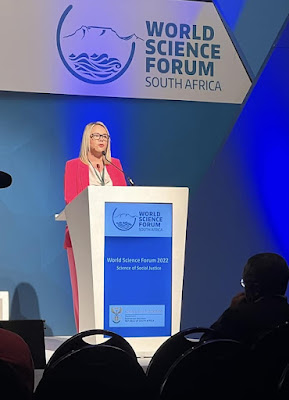Science that listens and collaborates
(World Science Forum 2022 Cape Town )
In typical Global Young Academy (GYA) and Science Leadership Programme (SLP) practice, we see all challenges as opportunities for change, and our discussions for solutions start with "how might we...?" and "how can we...?". Then the power and responsibility are on us to make the change.
So, how might we unblock the channels of influence of science and technology to unblock or assist more than we already do with greater societal challenges?
..or how might we overcome the hurdles?
1) Communication of science
And as soon as we read/hear this, we all tend to focus on how we, as scientists, communicate our findings to the public and policymakers. I would rather focus here more on the scientist as a listener.
Gone are the times that a scientist sits in the lab, produces results and says, "my way or the highway".
The best research endeavours I know are informed by communities, understanding the needs and conditions of what happens there now. The first example is one by the research work of Nobel Laureates Proffs Duflo and Banerjee in the book Poor Economics. (the following is my own description and understanding of the research they have done). An interesting observation was made in a rural area in India: baby girls had a higher probability of dying from water-related diseases than baby boys. To solve this problem, scientists and local policymakers for years spent time and effort in water quality fixing (which indeed needed fixing..), but also in examining the physiological differences between boys and girls. Nothing concrete came out of this, so the research team went to spend time with the community. In the local culture, families value a boy more than a girl. When a woman gave birth to a girl, she was only allowed to breastfeed for a short period, so she started trying to fall pregnant again - to give birth to the desired boy. That was not the case with a boy-mama that is encouraged to breastfeed the boy as long as possible. This separation results in baby girls starting to drink water much earlier than boys while their immune systems are not fully developed.
I read a statistic a long time ago that African citizens are reluctant to adopt new technologies such as LED energy-saving bulbs. That article went on about the cultural differences of the African population. When I visited Abuja in 2018, I made a point of asking as many people as possible - and I received mostly the same answer. With frequent power cuts, LED bulbs burn much easier than traditional bulbs, so they can become expensive and not serve their saving purpose.
If we, as scientists, don't listen, we might try to solve problems that don't exist and waste resources in the wrong places.
2) Collaboration and cooperation
Scientific solutions and technological achievements in the past were discipline-specific and aimed at solving one problem at a time. In a world of constraints and limited resources, or (as it was fairly pointed out by the audience) rather a world of misallocated resources, I am looking forward to synergies and win-win conditions in proposed solutions. We should be careful in introducing solutions that solve one thing and destroy the progress in something else.
One of the biggest issues in the African continent is access to energy. In the past, we looked at infrastructure and how to expand the national grid. Nowadays, the research looks at mini-grids, solar power solutions and community-owned generation. What do we improve then? 1) Energy access and energy poverty improving thus the living conditions of the population; 2) Economic poverty; Communities now can sell the excess energy they generate and, thus, generate additional income as well; 3) Climate change considerations; the communities will not use dirty fuels that are the reason for air pollution and several deaths due to lung problems. And all that, without creating generations dependent on social grants, but allowing social integrity and social justice to prevail by inclusive governance.
So I call today for Science that not only talks but listens...
that is prepared to co-create solutions
that collaborates and combines resources for greater societal benefit.
Inspired by
Duflo, E., & Banerjee, A. (2011). Poor economics (Vol. 619). PublicAffairs.
https://blogs.scientificamerican.com/guest-blog/scientists-should-talk-to-the-public-but-also-listen/



Lovely. I like your writing style and message conveyed.
ReplyDelete